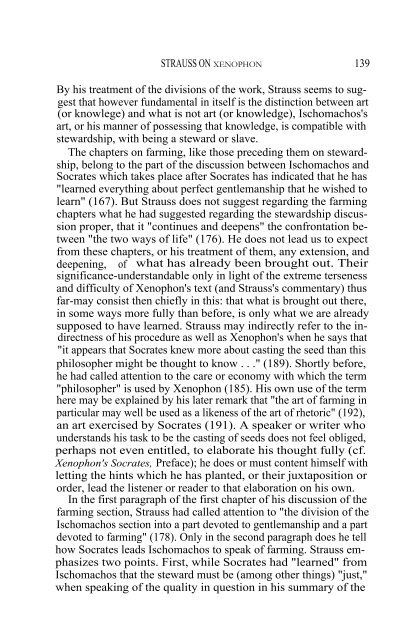Strauss on Xenophon's Socrates Xenophon's Socratic Discourse: An ...
Strauss on Xenophon's Socrates Xenophon's Socratic Discourse: An ...
Strauss on Xenophon's Socrates Xenophon's Socratic Discourse: An ...
You also want an ePaper? Increase the reach of your titles
YUMPU automatically turns print PDFs into web optimized ePapers that Google loves.
STRAUSS ON XENOPHON 139<br />
By his treatment of the divisi<strong>on</strong>s of the work, <str<strong>on</strong>g>Strauss</str<strong>on</strong>g> seems to suggest<br />
that however fundamental in itself is the distincti<strong>on</strong> between art<br />
(or knowlege) and what is not art (or knowledge), Ischomachos's<br />
art, or his manner of possessing that knowledge, is compatible with<br />
stewardship, with being a steward or slave.<br />
The chapters <strong>on</strong> farming, like those preceding them <strong>on</strong> stewardship,<br />
bel<strong>on</strong>g to the part of the discussi<strong>on</strong> between Ischomachos and<br />
<strong>Socrates</strong> which takes place after <strong>Socrates</strong> has indicated that he has<br />
"learned everything about perfect gentlemanship that he wished to<br />
learn" (167). But <str<strong>on</strong>g>Strauss</str<strong>on</strong>g> does not suggest regarding the farming<br />
chapters what he had suggested regarding the stewardship discussi<strong>on</strong><br />
proper, that it "c<strong>on</strong>tinues and deepens" the c<strong>on</strong>fr<strong>on</strong>tati<strong>on</strong> between<br />
"the two ways of life" (176). He does not lead us to expect<br />
from these chapters, or his treatment of them, any extensi<strong>on</strong>, and<br />
deepening, of what has already been brought out. Their<br />
significance-understandable <strong>on</strong>ly in light of the extreme terseness<br />
and difficulty of Xenoph<strong>on</strong>'s text (and <str<strong>on</strong>g>Strauss</str<strong>on</strong>g>'s commentary) thus<br />
far-may c<strong>on</strong>sist then chiefly in this: that what is brought out there,<br />
in some ways more fully than before, is <strong>on</strong>ly what we are already<br />
supposed to have learned. <str<strong>on</strong>g>Strauss</str<strong>on</strong>g> may indirectly refer to the indirectness<br />
of his procedure as well as Xenoph<strong>on</strong>'s when he says that<br />
"it appears that <strong>Socrates</strong> knew more about casting the seed than this<br />
philosopher might be thought to know . . ." (189). Shortly before,<br />
he had called attenti<strong>on</strong> to the care or ec<strong>on</strong>omy with which the term<br />
"philosopher" is used by Xenoph<strong>on</strong> (185). His own use of the term<br />
here may be explained by his later remark that "the art of farming in<br />
particular may well be used as a likeness of the art of rhetoric" (192),<br />
an art exercised by <strong>Socrates</strong> (191). A speaker or writer who<br />
understands his task to be the casting of seeds does not feel obliged,<br />
perhaps not even entitled, to elaborate his thought fully (cf.<br />
Xenoph<strong>on</strong>'s <strong>Socrates</strong>, Preface); he does or must c<strong>on</strong>tent himself with<br />
letting the hints which he has planted, or their juxtapositi<strong>on</strong> or<br />
order, lead the listener or reader to that elaborati<strong>on</strong> <strong>on</strong> his own.<br />
In the first paragraph of the first chapter of his discussi<strong>on</strong> of the<br />
farming secti<strong>on</strong>, <str<strong>on</strong>g>Strauss</str<strong>on</strong>g> had called attenti<strong>on</strong> to "the divisi<strong>on</strong> of the<br />
Ischomachos secti<strong>on</strong> into a part devoted to gentlemanship and a part<br />
devoted to farming" (178). Only in the sec<strong>on</strong>d paragraph does he tell<br />
how <strong>Socrates</strong> leads Ischomachos to speak of farming. <str<strong>on</strong>g>Strauss</str<strong>on</strong>g> emphasizes<br />
two points. First, while <strong>Socrates</strong> had "learned" from<br />
Ischomachos that the steward must be (am<strong>on</strong>g other things) "just,"<br />
when speaking of the quality in questi<strong>on</strong> in his summary of the

















